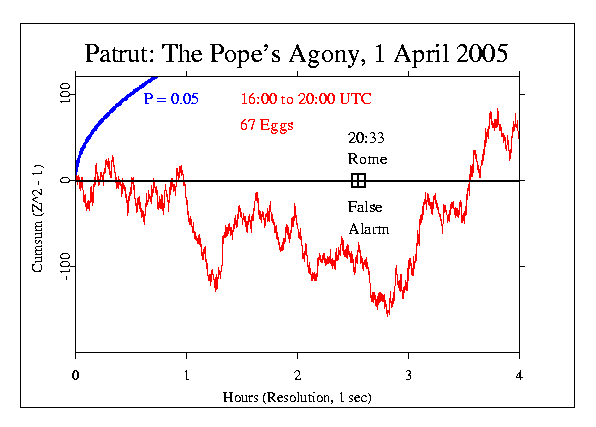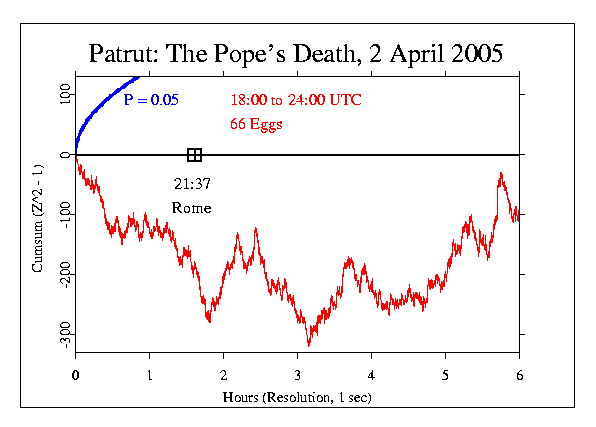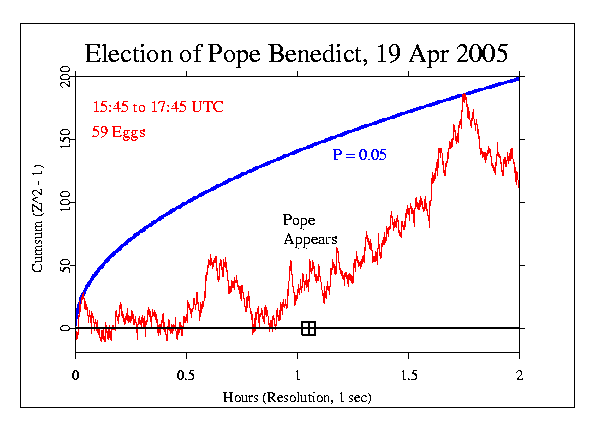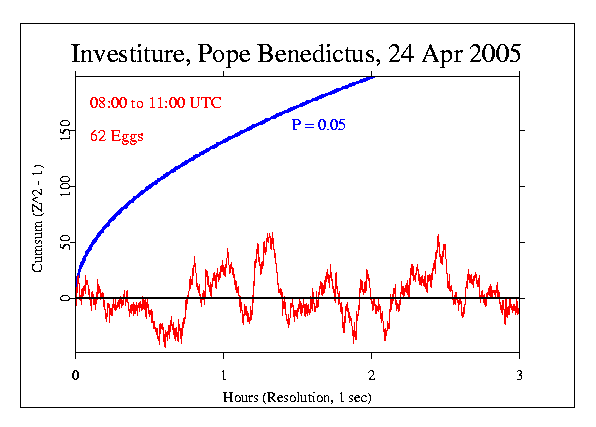Adrian Patrut sent a detailed description of events surrounding the
Pope's death. An exploratory assessment can add to our ability to
interpret the data over this period.
For the formal analyses, see Pope's Death and
Funeral.
1. THE POPE'S AGONY
Friday, April 1, 2005.
After the alarming news were broken on the Pope's health, along with ca.
70,000
people gathered in St. Peter's square, several hundreds of million
people
watched on TV the fast progress of events.
At 17.00 UTC, a medical report was released on the Pope's extremely
severe
condition.
At 17.07, the Swiss guards closed one of the entrance doors (the bronze
western door) of the Vatican, announcing by this the close decease of
the Pope.
At 17.08, a new medical report states that the condition of the pope is
hopeless.
From 17 through 18.10, an emotional service was held in San Giovanni
basilica
in Laterano in Roma, for the Pope's health. This service, celebrated by
Cardinal Camillo Ruini, vicar of rome, was broadcasted in the entire
world
(including Al Jazeera).
At 17.43, Cardinal Ruini announced that "the
Pope
already sees and touches the Lord". Italy's President Carlo Ciampi and
Prime
Minister Silvio Berlusconi attended the service.
At 18.21, several press agencies reported that the Pope would be in
cerebral
death status.
At 18.33, several press agencies wired the announcement according to
which the
Pope has passed away. (I believe that this moment has generated an
extreme
emotion.). The information is not confirmad by the Vatican.
At 18.45, the Vatican has denied the information, stating that the Pope
is
still alive and he would not even be in coma, though his condition is
irremediably compromised.
Millions of people continued waiting on updates regarding the Pope's
condition.
I believe that one should analyze the results in the time frame 16 - 20
UTC.

2. THE POPE'S DEATH
Saturday, April 2, 2005
At 19.37 UTC the Pope passed away.
At 19.51, ANSA Agency, re-wired by RAI UNO, has announced laconically
the Pope's death.
At 19.57. CNN and other TV stations have reported the death.
At 20.10, Cardinal Camillo Ruini, vicar of Rome, announced officially to
the
crowd in Piazza San Pietro that "our beloved Pope has returned Home".
After that, all major TV stations have dedicated programs to the Pope's
memory.
I believe that one should analyze the results in the time frame 18 - 24
UTC.

3. THE FUNERAL OF POPE JOHN PAUL II (KAROL WOYTYLA)
Friday, April 8, 2005.
08.03 - 08.06 UTC: the cypress coffin with the Pope's corpse is brought
out from St. Peter's Basilica and placed in the square.
08.07 - 08.17: the homage of cardinals and patriarchs in front of the
coffin.
08.18 - 10.32: Cardinal Ratzinger holds the Funeral Mass in St. Peter's
square, in the presence of over 100 cardinals and 300 political
personalities, as well as millions around St. Peter's Square and over
one
billion in front of televisions everywhere.
10.37 - 10.41: the coffin with the Pope's corpse is lifted from St.
Peter's square and brought back to the Basilica.
no time data: the public ceremony was followed by a private ceremony,
during which the cypress coffin with the Pope's remains was be sealed
into
a zinc coffin, then into another oak casket and was placed into a marble
tomb in the grottoes beneath St Peter's Basilica.
4. THE ELECTION OF THE NEW POPE
It will be announced by the Cardinals Conclave that will start on April
18.
Adrian Patrut provided details of the Papal election and annnouncement of
Cardinal Ratzinger as the new Pope, who chose the name Benedictus XVI.
Adrian proposed that we should analyze the results in the time frame 15:45
17:45 UTC, and the following graph shows the result, which is a strong,
positive trend, especially following the new Pope's first appearance.
This is again, not
a formal hypothesis test, but is provided for context.
Adrian Patrut provided details of the Investiture of the New Pope, on
April 24 2005.
Adrian proposed that we should analyze the results in the time frame
08:00 to 11:00 UTC, and the following graph shows the result, which is
about as flat as can be. This is again, not
a formal hypothesis test, but is provided for context.



